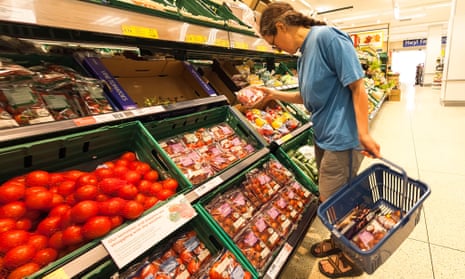Tesco and Carrefour, Britain’s biggest grocer and Europe’s largest retailer, have increased the pressure on supermarket suppliers by teaming up to buy products for more than 19,000 stores – a move they claim will lead to greater choice and lower prices for customers.
Analysts said the planned three-year strategic alliance between two retail powerhouses would squeeze suppliers further as the supermarket industry fights back against the rise of Amazon and discounters such as Aldi and Lidl.
Tesco and its French peer Carrefour will buy own-brand products together and attempt to secure better deals from multinationals such as the Nescafé maker Nestlé and Unilever, which makes Persil and Marmite. Tesco and Carrefour said they aim to improve the quality and choice of products in their supermarkets and sell them at cheaper prices. Each company will continue to work with their suppliers at a local and national level.
The Tesco chief executive and former Unilever executive, Dave Lewis, said: “By working together and making the most of our collective product expertise and sourcing capability, we will be able to serve our customers even better.”
The strategy could lead to more camembert, wine and other French products being sold in Tesco stores and more British products in Carrefour supermarkets, although details have yet to be finalised, according to a Tesco spokeswoman.
Both retailers are under pressure because Amazon has moved into traditional grocery retailing with the acquisition of Whole Foods and launched an online delivery service, Fresh, in the UK last year.
Sainsbury’s has made it clear that if its proposed takeover of Asda is given the go-ahead from competition regulators, it will target its biggest suppliers for cost reductions by flexing its increased buying power.
“Tesco and Carrefour will look to do the same while reducing the number of branded products they sell as they increase their own-brand ranges,” Patrick O’Brien, the UK retail research director at GlobalData, said. “For suppliers, this is another signal of battles ahead.”

Analysts at Jefferies estimate the combined buying power of Tesco and Carrefour at more than £80bn annually. They believe the groups could reap total savings of £400m from the alliance.
Philip Benton, a research consultant at Euromonitor International, added: “Tesco may also see this as a safeguarding of risk against possible supplier price rises in the event of a hard Brexit.”
Under the alliance, to be formally agreed within the next two months, Tesco and Carrefour could also reduce their costs by clubbing together to buy petrol for delivery vans as well as functions such as legal services and accounting.
Neil Wilson, the chief market analyst at Markets.com, said: “An entente cordiale between the two giants of British and French retailing is yet another sign that squeezing the cost base is the biggest priority for supermarkets as they seek to contain the discounters and protect margins.
“On both sides of the Channel, rising costs are putting pressure on margins. Meanwhile, every retailer is looking over their shoulder at Amazon and the potential disruption it could still cause in the grocery sector.”
Carrefour is slashing thousands of jobs and other costs, and ramping up digital investment after profits fell for the second year in a row.
FMCG suppliers can't seem to catch a break - supermarket consolidation, Amazon stepping up private label efforts and now a buying alliance between two of the world's largest food retailers.
— Natalie Berg (@Natalie_Berg) July 2, 2018
Tesco has fared better recently, recording its strongest sales growth in seven years, bolstered by its acquisition of the Booker wholesaler, but it remains under pressure from the German discounters Aldi and Lidl. According to Euromonitor International, a combined Carrefour and Tesco will hold an 8% of the western European grocery market, ahead of Lidl’s owner on 6% and Aldi Group on 5%. Carrefour makes the bulk of its €79bn (£70bn) worth of sales in Europe and Brazil while Tesco operates in Britain, Ireland, eastern Europe, Malaysia and Thailand, and has a wholesale presence in India.
The independent retail analyst Natalie Berg tweeted: “Interesting collaboration. Buying alliances are common in Europe but unusual to see two of the largest global food retailers join forces. Everyone’s choosing sides before Amazon strikes.”
Referring to fast-moving consumer goods, she added: “FMCG suppliers can’t seem to catch a break – supermarket consolidation, Amazon stepping up private label efforts and now a buying alliance between two of the world’s largest food retailers.”
O’Brien, at GlobalData, said: “Tesco is obviously concerned by the increased potential buying scale of a combined Sainsbury’s and Asda, and both it and Carrefour are worried by the idea of Amazon making more ambitious moves in European grocery retail.
“However, it should be noted that a key focus of the tie-up is to reduce prices on own-brand products and this is more of a direct response to Aldi and Lidl, whose offers are heavily weighted towards own-brand. Tesco and Carrefour have both struggled to match the discounters on quality and price, and the alliance should help it compete.”
Tesco
Chief executive Dave Lewis
Number of employees worldwide 440,000
Annual revenues £51bn (£64.5bn estimated post-Booker)
Annual profits £1.6bn
Number of countries 10
Number of stores 6,800
Carrefour
Chief executive Alexandre Bompard
Number of employees worldwide 379,000
Annual revenues €79bn
Annual profits €2bn
Number of countries 33
Number of stores 12,300
